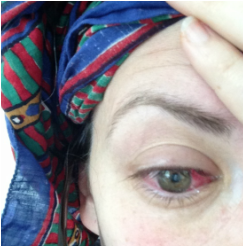 The eye of Sauron The eye of Sauron I'm going to share something personal with you, Dear Reader. I have an autoimmune condition. Well, technically two, but who's counting? I was first diagnosed with ankylosing spondylitis when I was 22. I had been experiencing symptoms, painful swollen joints, since I was nineteen, which is a typical time for this condition to show up, but it took three years for my doctors to believe that there was something real happening in my body. When my first diagnosis came, after a week away at summer camp during which I had night sweats and my collarbone and toe started to swell, I realized that I needed to trust myself. I knew something was wrong, even when my doctor thought I was crazy. Fastforward ten plus years, when after the birth of second child, I took a job at my school as one of two chief administrators. Having recently given birth to my son, I spent the first six months of my new job as a Director waking up six times a night because I was still nursing little E. And as any rhuematologist or GP worth their salt will tell you, stress and particularly lack of sleep are two no-nos for those with auto-immune conditions. In the Spring of '14, I started having a flare. My eyes started to become inflamed, specifically my irises. I do a lot of functional medicine for my condition, but in this case, it wasn't working. Over the next year, I did a course of steroids, which helped, and then didn't. I started having other joints flare. My big toe grew twice its normal size. I went in for tests and got a new diagnosis added onto the old one: rheumatoid arthritis. Then my knees ballooned, first the left, then the right. My right elbow started to be so sore I couldn't close it. So this summer, I got clear I had to take my approach to a whole new level. I had forgotten what it meant to listen to my body. I made changes. I rearranged my schedule to have more down time. I started a more serious drug. Upon receiving some wonderful advice from a dear friend, I took a machete to the overfull areas of my life and started chopping away obligations that were not serving me. I spent more time with my wonderful husband and two kids. I stopped regulating everyone and everything around me (my tendency under stress) and stepped back into a smaller circle of influence, one that feels more authentic to me. Healing is a done in a circle, not a line. My auto-immune conditions offer opportunities to me that I would not otherwise have. I've done enough therapy to know that I somatize my emotional pain and frustration. I also prioritize others needs first. My body tells me when those tendencies get out of balance. So in the midst of a flare, I go back to the basics. I take my pharmaceutical medication when I need it. Every day I eat carefully. I do therapy. I do acupuncture. With an auto-immune condition, we are talking about continuums of health that have a series of causes; my response to my condition is systems thinking at its most basic. Maybe it's dramatic, but I want to suggest that the ability to be clued into what is triggering one's body in unhealthy ways is the single most important thing someone who has a challenging relationship with physical health should cultivate. At the school, our faculty teach students to be clued into their own emotions and thoughts and bodies every day (This is part of what the Integral model calls second-tier thinking. Specifically in this case, self-knowing) but I didn't learn body connection and awareness as a child. Now I am learning it as an adult. People sometimes ask me about less mainstream treatment choices I make, "Does that even work?" My answer is this: the interesting thing about the new paradigm of medicine is that I don't need a double-blind study to confirm the truth of my personal experience. I don't need an objective measurement to find real success. In order to heal, I have to listen to my body, pay attention, and make the choices that work best for me. This time around I've worked hard, and I've been blessed. In four months, I've gone from barely walking to being able to move around pretty freely. I've decreased my medication. I have little to no pain on most days. I am frequently thankful. I also don't eat a lot of starches, or at least not that frequently. I don't drink caffeine. I don't eat a lot of meat. I try to stay away from sugars, except for dark chocolate occasionally (my weakness!) I sleep more. And more than all of those dos or don'ts, I cultivate the ability to listen to my body. And you know--I'm terrible at it. But at least I'm learning. Comments are closed.
|
AuthorCoranna Adams is a writer, filmmaker, and educator from Asheville, North Carolina. Archives
December 2023
Categories
All
|
|
Click to set custom HTML
|
Site Copyright Coranna Adams, 2023 all rights reserved. Do not copy or reproduce without permission.
|

 RSS Feed
RSS Feed